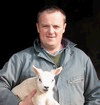Management changes improve flock health

A radical change in sheep management is on the cards at Fearn Farm. Carol McLaren reports
John Scott plans a new management system for the family’s sheep enterprise to reduce labour and improve flock health.
The details of the overhaul have to be thrashed out by the sheep sub-committee as part of Fearn’s Monitor Farm involvement, says John. Proposed plans include a move away from housing ewes through the winter, a system the family has been operating for more than 20 years.
“We are looking at leaving the ewes outside and not shearing them, with the aim of having a less labour-intensive system,” says John.
Similarly, the farm’s machinery fleet has been receiving attention. John and his father, James, looked at replacing their three-year-old JCB Loadall, the main workhorse on the farm. But with stock and crop returns more uncertain than expected, that plan has been shelved.
Cash flow
“One of our big problems at the moment is cash-flow. Foot-and-mouth restrictions have meant no cash coming in from pedigree stock sales, and the harvest is up to 10 days later than usual so there will be a delay in the grain cheque,” says John.
On top of that, the cold, wet conditions have meant their lambs are finishing significantly slower than usual, with 1000 still on the farm.
“Lack of sunshine has been the main problem. The lambs just haven’t come on as well as they usually do and we have now started feeding them,” he says. The lambs are being fed barley (0.1kg/head/day) from an ad-lib feeder.
Sheep have traditionally been the most profitable enterprise on the farm, so the falling lamb price is a real concern for the Scotts. All their lambs are sold at around 20kg to Highland marketing group, Mey Selections, which is still paying 15p/kg above the Scottish average.
Performance
The poor weather is also hitting the performance of the stubble turnip crop, which is struggling to establish. “The jury is out on the stubble turnips this year and we may well end up feeding silage to the cows. Last year the cows performed really well on the stubble turnips but the weather has just been too bad for the crop, which is in a very sandy field. The plants are there but they are really struggling,” says James.
Other arable crops’ performance has been mixed. Sequel and Amarena Winter barley yielded an average of 3t/acre, while Grace oilseed rape produced 1.5t/acre. Spring barley harvesting has just started, with the first two fields of Optic yielding 3t/acre and 2.7t/acre at 19% moisture.
All the malting barley (Optic and Catriona) is sold on contract to traders Frontier and Scotgrain. With market prices soaring for grain the Scotts’ contract prices, ranging from £117/t at 1.66%N to £125/t for under 1.4%N, look much less exciting than earlier in the year.
The weather has also hit winter forage plans. With a huge grass surplus earlier in the year there had been potential to make hay, but the rain put paid to that.
“Last year we made 150 bales of silage and 700 bales of hay, but this year we have ended up with 1000 bales of silage, a yield of about 12 bales/acre. We are planning to cut back on our grass acreage fairly drastically next year. With no oilseed rape – assuming set-aside goes – we are looking at increasing our spring barley by 140-150 acres,” says John.
New recruit
A welcome new recruit is sixteen-year-old student John McLean, who has been at Fearn since June and is the sole employee on the farm.
John, from Huntly in Aberdeenshire, has thrown himself into the workload and the Scotts are delighted he has decided to take a year out to work with them before college.
“He is very enthusiastic, full of energy and coping admirably with working with us.” said John.
And the family is expecting further change. John and his wife, Fiona, are expecting a baby in January. The arrival of child number four to join James, Izzy and Lexie means a bigger family vehicle is needed, focusing John’s mind more than ever on the farm bank account.
- More information on Fearn Farm
- More information on other Management Matter farms
